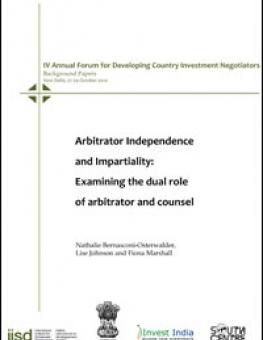
Arbitrator Independence and Impartiality: Examining the dual role of arbitrator and counsel
This paper examines the investor-State arbitrations in view of the available common institutional safeguards ensuring arbitrator independence and impartiality.
It highlights how the existing framework can and should be used to better resolve existing problems, and focuses on the type of conflict of interest that can arise from arbitrators in investor-State disputes serving as counsel in other investor-State arbitrations. The paper analyzes the rules commonly used in investor-State arbitrations and the decisions evaluating the dual-role issue. It further examines the International Bar Association (IBA) Guidelines and Burgh House Principles and describes the guidance they provide on the subject. In conclusion, the paper discusses the options for implementing improved and consistent responses to address and resolve the issues related to the current dual-role phenomenon in investor-State arbitrations.
You might also be interested in
Why the Energy Charter Treaty Modernization Doesn't Deliver for Climate
The Energy Charter Conference adopted the "modernized" Energy Charter Treaty (ECT) on December 3, 2024. IISD's Lukas Schaugg explains what the modernization does, when it will enter into force, its tension with EU law, and why the reformed ECT can still hinder climate policies.
The Responsible Agricultural Investment Tool for Agribusiness and Case Studies
This report summarizes a collaboration to support agribusinesses in complying with principles of responsible investment in agriculture and food systems.
Stabilization Clauses: The hidden provisions that can hinder tax and investment policy reform
Stabilization clauses should no longer automatically be included in contracts between states and investors. If they are, they should, at a minimum, build on the latest international standards on stabilization to avoid being a barrier to sustainable development.
What Drives Investment Policy-makers in Developing Countries to Use Tax Incentives?
The article explores the reasons behind the use of tax incentives in developing countries to attract investment, examining the pressures, challenges, and alternative strategies that exist.